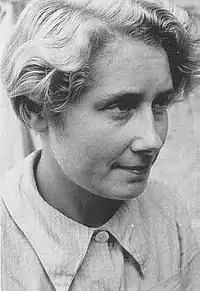Hel Braun
Helene (Hel) Braun (June 3, 1914 – May 15, 1986) was a German mathematician who specialized in number theory and modular forms.[1][2] Her autobiography, The Beginning of A Scientific Career, described her experience as a female scientist working in a male-dominated field at the time, in the Third Reich.[3]
Professor Helene (Hel) Braun | |
|---|---|
 Hel Braun at the University of Marburg in 1941. | |
| Born | 3 June 1914 |
| Died | 15 May 1986 (aged 71) |
| Nationality | German |
| Education | University of Marburg |
| Known for | Proving the convergence of the Eisenstein series |
| Scientific career | |
| Fields | number theory, modular forms |
| Institutions | University of Göttingen, University of Hamburg |
| Doctoral advisor | Georg Aumann |
She is known for proving the convergence of the Eisenstein series.[4]
Scientific career
Braun studied mathematics at the University of Marburg from 1933 to 1937. In 1937 she worked with Carl Ludwig Siegel in Frankfurt to study the decomposition of quadratic forms into sums of squares. Her dissertation, Über die Zerlegung quadratischer Formen in Quadrate, was also supervised by Georg Aumann.[5] After completing that work, he took her on as a scientific assistant before she became a professor in her own right teaching the theory of Hermitian forms in 1940.
She became a lecturer at the University of Göttingen in 1941, becoming a full professor in 1947. From 1947 through 1948, she was a member of the Institute of Advanced Studies.[6]
In 1951, Braun moved and became a professor at the University of Hamburg where she met and worked with Emil Artin and other internationally acclaimed mathematicians of the time.
Personal life
Braun never married, but in the 1960s while she was a professor at the University of Hamburg, she shared an apartment with Emil Artin, and their relationship was equivalent to marriage according to everyone who knew them.
After she retired in 1981, she lived out the rest of her life in Hamburg.
Selected publications
A list of the publications by Hel Braun was published by Helmut Strade in the Communications of the Mathematical Society in Hamburg, Volume XI, Issue 4, 1987.[1] She wrote two books:
- Braun, Hel; Koecher, Max (1966), Jordan-Algebren [Jordan Algebras], Die Grundlehren der mathematischen Wissenschaften in Einzeldarstellungen mit besonderer Berücksichtigung der Anwendungsgebiete (in German), 128, Berlin: Springer-Verlag, ISBN 3-540-03522-2[7]
- Braun, Hel (1989), Koecher, Max (ed.), Eine Frau und die Mathematik 1933–1940: der Beginn einer wissenschaftlichen Laufbahn [A Woman and Mathematics 1933–1940: The beginning of a scientific career] (in German), Berlin: Springer-Verlag, doi:10.1007/978-3-642-75427-2, ISBN 3-540-52166-6.[3]
References
- Strade, H. (1987), "Hel Braun: 1914–1986", Mitteilungen der Mathematischen Gesellschaft in Hamburg, 11 (4): 373–376, MR 0914073
- Pieper-Seier, Irene (1997), "Zwei erfolgreiche Frauen in der Mathematik: Ruth Moufang (1905–1977) und Hel Braun (1914–1986)" [Two successful women in mathematics: Ruth Moufang (1905–1977) and Hel Braun (1914–1986)], Mitteilungen der Mathematischen Gesellschaft in Hamburg (in German), 16: 25–38, MR 1616771
- Review of Eine Frau und die Mathematik: Scriba, Christoph J. (1992), Berichte zur Wissenschaftsgeschichte, 15 (3): 199–200, doi:10.1002/bewi.19920150311CS1 maint: untitled periodical (link)
- Terras, Audrey (2016), Harmonic analysis on symmetric spaces—higher rank spaces, positive definite matrix space and generalizations (2nd ed.), New York: Springer-Verlag, p. 424, doi:10.1007/978-1-4939-3408-9, ISBN 978-1-4939-3406-5, MR 3496932
- Hel Braun at the Mathematics Genealogy Project
- "Hel Braun". Institute for Advanced Studies. Retrieved 2018-03-04.
- Review of Jordan-Algebren: Glennie, C. M., Mathematical Reviews, MR 0204470CS1 maint: untitled periodical (link)
External links
- Photos of Hel Braun in the Oberwolfach Photo Collection
![]() Media related to Hel Braun (mathematician) at Wikimedia Commons
Media related to Hel Braun (mathematician) at Wikimedia Commons